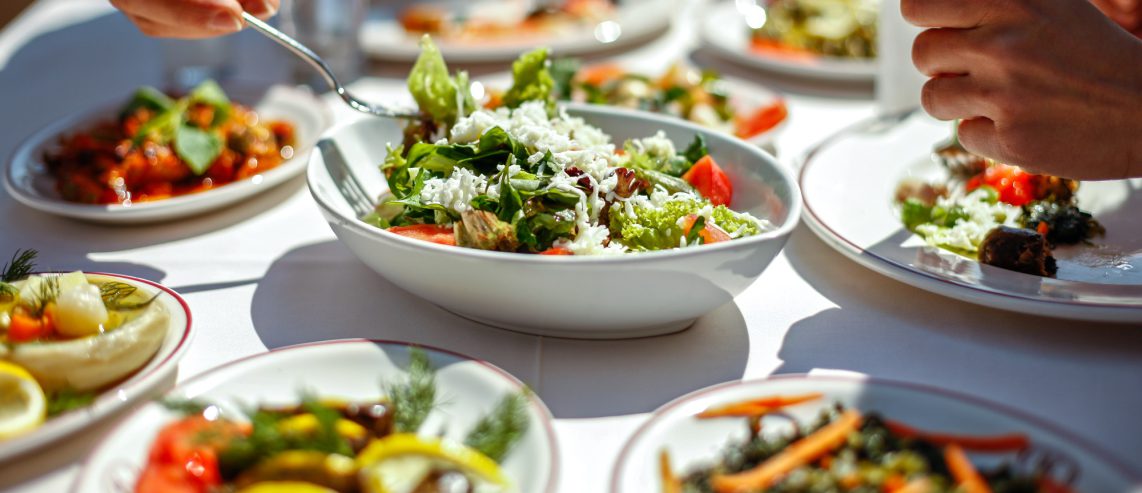If you have diabetes or prediabetes, managing your blood sugar (glucose) will reduce your risk of developing other health problems. Medications can help, but did you know there are some strategies to naturally lower high blood sugar?
Diet and lifestyle changes can make a significant difference in your long-term blood sugar levels and overall health. And they’re easier to make than you might think. Learn more about how to lower blood sugar naturally and simple changes you can start making today.
Never Miss a Beat!
Subscribe to Our HealthBeat Newsletter!
Thank you for subscribing!
You can now select the specific newsletters you'd like to receive.
You are already subscribed.
Subscribe to more newsletters in our email preference center.
Sorry, an error occurred. Please try again later.
Get Healthy Tips Sent to Your Phone!
Blood Sugar Levels and Diabetes
Normal blood sugar is 70 to 99 mg/dL when fasting or less than 140 mg/dL after eating a meal or snack. You may have prediabetes, a sign that you’re developing diabetes, if your blood sugar is:
- 100 to 125 mg/dL when fasting.
- between 140 and 199 mg/dL after you eat.
With diabetes, blood sugar is:
- Higher than 126 mg/dL when fasting.
- Higher than 200 mg/dL after eating.
What Causes High Blood Sugar?
Glucose readings that are higher than normal mean too much glucose is in your blood; it’s not getting into your cells. It happens when insulin stops working correctly. Insulin is a hormone that helps move glucose from your blood into your cells.
High blood sugar happens for various reasons, including:
- It runs in your family.
- You’re overweight, especially if you carry your weight in your belly.
- You’re eating too many carbohydrate-rich foods.
- You’re not getting enough physical activity.
- You have an illness or infection.
- You might need more diabetes medicine.
Over time, high blood sugar can lead to problems with your:
- Eyes and vision.
- Nerves in your feet and lower extremities
- Kidneys.
- Heart and blood vessels.
Having a few high blood sugar readings doesn’t mean you’re destined to develop diabetes. Nor does it mean you can’t improve your blood sugar if you already have diabetes.
How to Lower Blood Sugar Naturally
Even if you have diabetes, there are things you can do to lower your blood sugar naturally. Taking these steps may reduce the amount of diabetes medicine you need. And if you have prediabetes, these strategies can help prevent diabetes altogether.
Choose healthy carbohydrates
Carbohydrates are in foods like:
- Bread, rolls, and cereal.
- Rice, pasta, quinoa, oats, and barley.
- Legumes (beans) like kidney, black, pinto beans, chickpeas, or lentils.
- Starchy vegetables like potatoes, sweet potatoes, corn, and peas.
- Non-starchy vegetables like carrots, broccoli, and sweet peppers.
- Fruit.
- Dairy foods like milk, yogurt, cottage cheese, and ice cream.
- Pastries, baked goods, and desserts.
- Candy.
- Soft drinks and other sweetened beverages.
Carbohydrates turn into glucose when they’re digested. Your body needs glucose throughout the day for fuel. But not all carbohydrate-rich foods act the same way when you eat them.
Refined carbohydrates from foods made with white flour and sugar get into your blood quickly. They also raise your blood sugar the most. But complex carbohydrates from vegetables, whole grains, and beans provide the glucose you need without raising your blood sugar as much.
To make sure you’re eating healthy carbohydrates:
- Include vegetables, fruits, beans, whole grains, low-fat milk, and unsweetened yogurt with your meals. These provide the glucose you need without spiking your blood sugar.
- Read the nutrition facts and ingredient labels when you shop. Choose carbohydrate-rich foods with 100% whole grains and at least three grams of fiber per serving. The fiber in these foods helps stabilize blood sugar, and it’s filling, so you’ll eat less.
- Cut back on refined carbohydrates like candy, soda, and baked goods. Save sugary foods and desserts for special occasions and split a portion with someone.
- Stick to small portions of carbohydrate-rich foods — no more than one-quarter of your plate. Fill the rest with lean meats like chicken or fish, non-starchy vegetables, and healthy fat from nuts, seeds, avocado, or olive oil. These have low or no carbohydrates.
Move more throughout the day
Exercise helps lower your blood sugar in several ways. It helps your insulin work better, so your body can more easily use glucose as energy. Exercise also promotes weight loss, and that in itself makes your body’s insulin more effective.
All forms of exercise are good, but the activities you enjoy and can do regularly are the best. Aim for at least 30 minutes of moderate exercise each day from activities like:
- Brisk walking or jogging.
- Hiking.
- Biking.
- Swimming.
- Playing a sport like tennis or soccer.
- Dancing.
- Power yoga.
Building muscle and reducing body fat also helps your insulin to work better. So try to include two to three days of strength training exercises each week. Light weights, resistance training, or Pilates are all good options.
If you have high blood sugar, research shows you’ll get the most benefit from exercise if you do it after eating. Try to work out or go for a brisk walk within three hours after eating breakfast, lunch, or dinner.
Get more quality sleep
Sleep is vital for overall good health. And getting a full night of restful sleep makes it easier to manage your blood sugar the next day. When you don’t sleep long enough or you have disrupted sleep, insulin doesn’t work as well.
Also, sleep-deprived people are more likely to have imbalances in their stress and hunger hormones. That leaves you feeling wired and extra hungry the next day.
Aim for seven to nine hours of uninterrupted sleep each night by doing the following:
- Go to bed and wake up at the same time each day. That helps maintain your body’s natural sleep-wake cycle.
- Keep your bedroom dark and at a cool, comfortable temperature while sleeping.
- Power down electronic devices like your phone, laptop, tablet, and television at least 30 minutes before bedtime. The blue light from these makes it harder to fall asleep.
- Stop eating at least three hours before bedtime to allow your stomach to empty before lying down. That reduces the risk of heartburn waking you up at night.
- Avoid caffeine and alcohol in the evening. These can make it harder to fall asleep or cause disrupted sleep.
If you have trouble sleeping or feel tired in the morning, talk to your health care provider. They can test you for sleep apnea, a condition where your breathing stops and starts. Having sleep apnea can worsen your blood sugar.
Manage your stress
Chronic stress does more than make you feel bad. It causes your body to release fight-or-flight hormones that raise your blood sugar. Stress also makes it harder to fall or stay asleep.
Some stress is inevitable, but if you feel like it’s getting the best of you, try to get a handle on it. Mind-body therapies like yoga, tai chi, or meditation can help. Try these in the evening, before bed, or during the day when you’re anxious or worried.
Working with a behavioral health therapist is also helpful. They can help you learn what triggers stress and ways to change how you think, feel, and react to it.
It’s easier to manage your blood sugar when you take a holistic approach. If your sugar is too high, your health care team can help you identify the root cause. And they can partner with you to make healthy lifestyle changes to naturally lower high blood sugar.
Sources
Sports Medicine. The Effects of Postprandial Exercise on Glucose Control in Individuals with Type 2 Diabetes: A Systematic Review. LINK
About UPMC
Headquartered in Pittsburgh, UPMC is a world-renowned health care provider and insurer. We operate 40 hospitals and 800 doctors’ offices and outpatient centers, with locations throughout Pennsylvania, Maryland, New York, West Virginia, and internationally. We employ 4,900 physicians, and we are leaders in clinical care, groundbreaking research, and treatment breakthroughs. U.S. News & World Report consistently ranks UPMC Presbyterian Shadyside as one of the nation’s best hospitals in many specialties and ranks UPMC Children’s Hospital of Pittsburgh on its Honor Roll of America’s Best Children’s Hospitals. We are dedicated to providing Life Changing Medicine to our communities.

